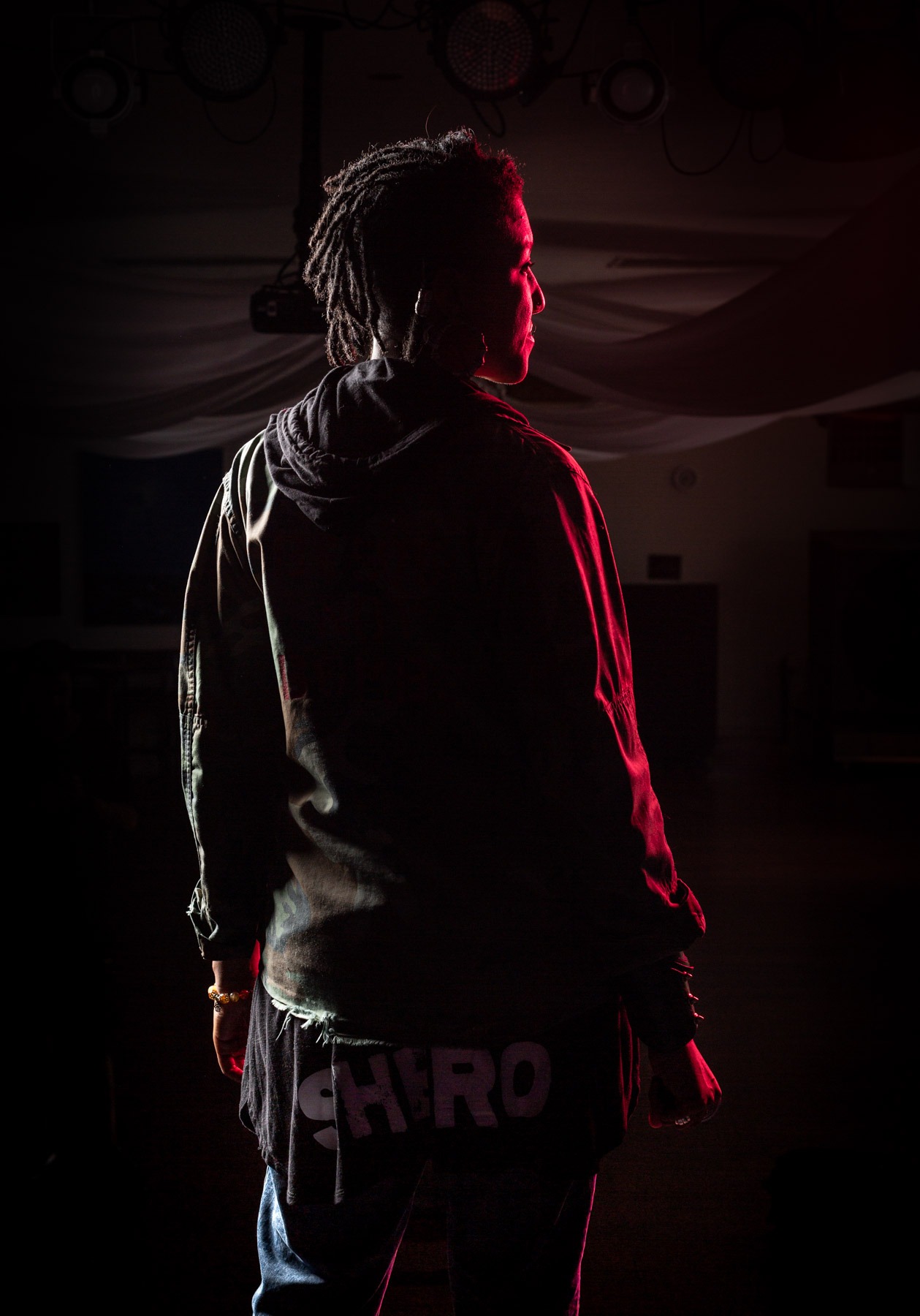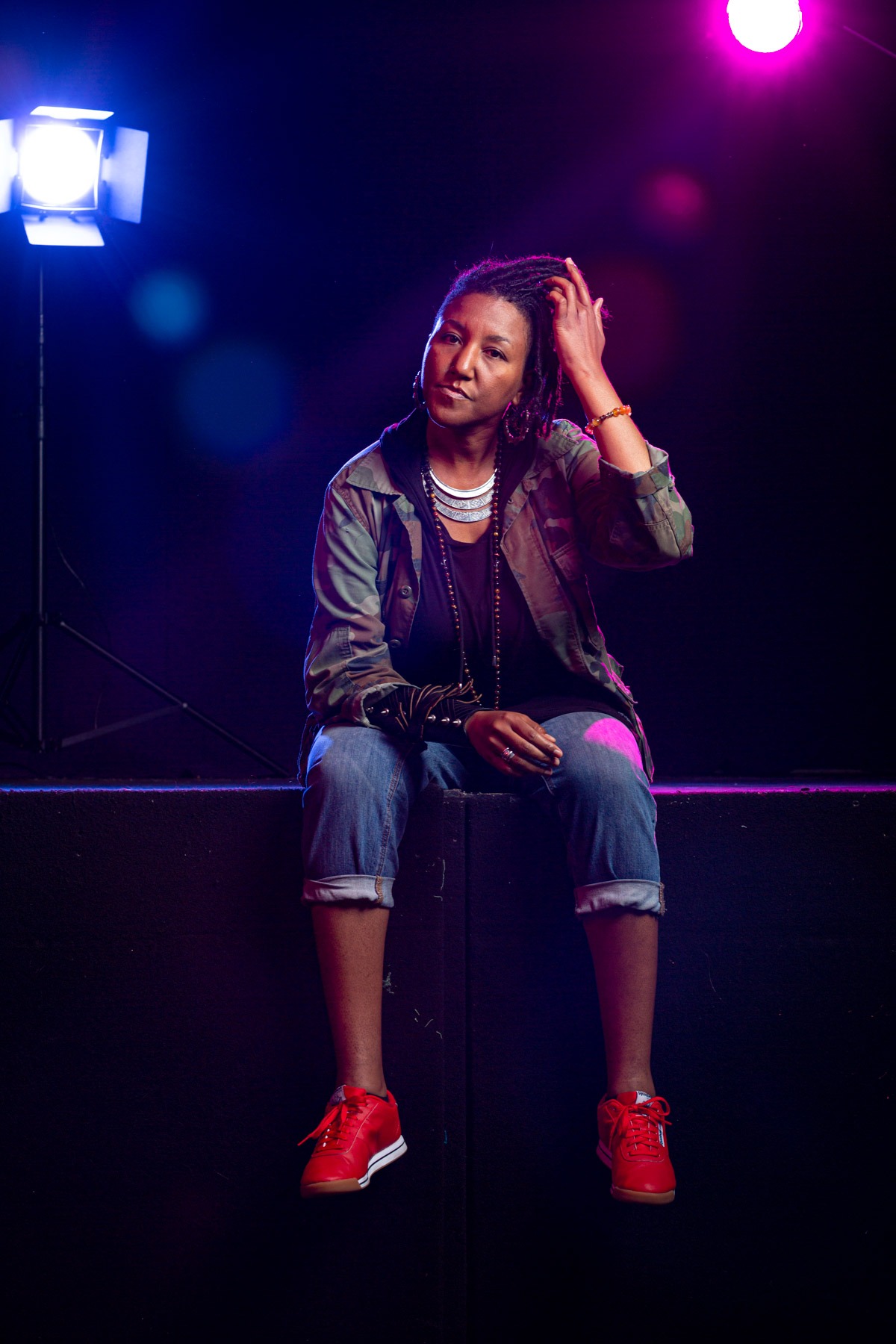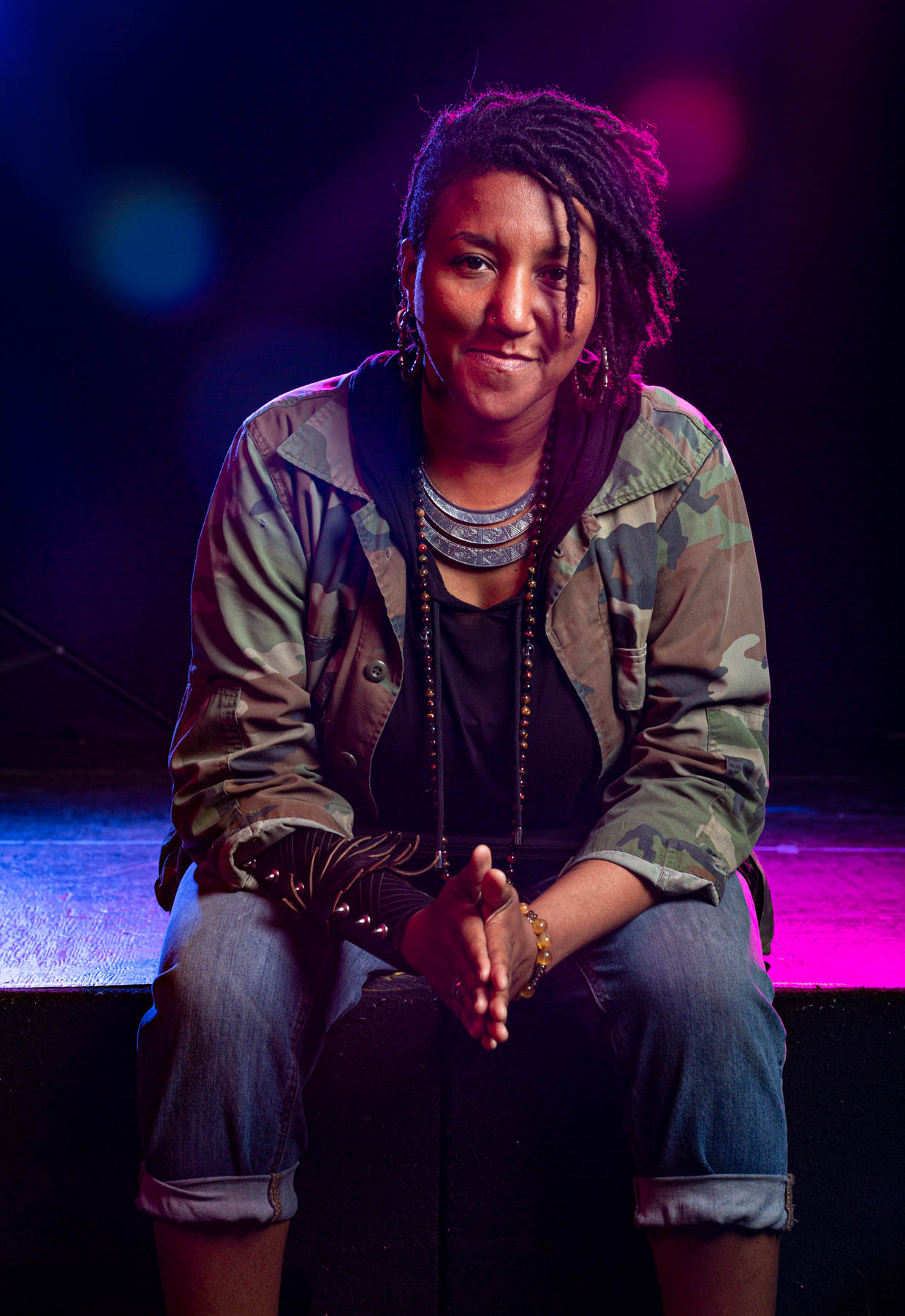JH Creator Miki Vale’s cover shoot with fellow Creator and photographer Nick Isabella takes place on a sunny afternoon in North Park. Of course, inside Queen Bee’s Art & Cultural Center, the vibe is distinctly ‘nightlife’ – from the dark hardwood floors to the draped chandelier above, from the grand piano we navigate around to get on and off the stage, to the giant mural of the San Diego skyline painted against a night sky. We are immersed in the arts and find ourselves in a discussion with the owner about the center’s upcoming 10-year anniversary in its North Park home. Home. Miki and I, both transplants to this city, discuss what makes a place feel like home.

Creator Spotlight | Respite
Miki Vale
Home is where...
Words by Revekka Balancier
Photos by Nick Isabella
Miki Vale the MC
Hip Hop and Soul Artist
Miki has been writing and performing her own hip-hop and soul for twenty-plus years. She is an artist of many talents – a poet, lyricist, and commissioned playwright, she has credits as a rap artist, she DJs, and she performs hip-hop as both a solo artist and part of a group. She has been writing her own music from the beginning. Before her cover shoot, she runs through a selection of Kara Ghilarducci’s Mala Beads, and after Kara explains the intentions of each, Miki chooses to wear the Tiger’s Eye meditation necklace made of tiger’s eye crystal, lava rock and clear quartz. It is a warrior mala, designed for courage and strength.
Miki’s lyrics are a unique combination of raw and inspirational. She is vulnerable, honest, and courageous in Grains of Sand, released in 2018, where the memory of her mother figures prominently. She smiles nostalgically in her video as she delivers the line, “Mama always said that I was too damn fearless.” She begins and ends the song by identifying as a survivor, particularly through her father’s treatment of both her and her mother. “Everything I been through/made me who I am/I ain’t mad/it’s just part of the plan.”
The song traces her youth, from sneaking alcohol and boys to using writing and music to drown out and deal with the pain of her father’s anger. “Soundtrack to my life/was mom and dad fighting/and I be in my room/with my pen and pad writing/trying to block out the sound/little girl lost and found.”
Miki’s vibe, though, is undeniably positive. Even through moments of self-frustration where she identifies with her father, she ends Grains of Sand with a reminder that she is a survivor, committed to evolving beyond his lacking legacy.
“I’m looking for that home-like place.”
Two of Miki’s other songs, created as part of the duo 50/50 with Queen Kandi Cole, show very different facets of Miki. The soulful and soothing Strip, released in 2017, is a song about reassurance, unconditional love and being able to share your true self with another person. Then there’s 2011’s Black, about the Black experience in America – political, cultural, and personal. It’s hard-hitting and unapologetically proud and motivating. Though the sounds and the subjects are diverse, Miki’s signature optimism shines through in each.

A new kind of writing:
When it’s right, it writes itself
Miki’s journey to commissioned playwright began with an invitation to participate in a beginner’s playwriting workshop at The Old Globe Theatre in Balboa Park. Her success led to a return invitation for the advanced workshop, where she began work on her first theatre short. But as life tends to do, twists and turns kept her from completing the play until a year later, inspired by looking back at a break-up. The Ex Games was a ten-minute comedy of sorts about three characters dealing with break-ups in different ways – one with guilt and self-blame, the second with anger and petty jokes, and the third with sadness and regret. These were in fact the faces of Miki as she moved through her own healing process following the end of the nine-year relationship.
The response was terrific. So terrific, in fact, it led to a commission to write an original full-length play for the stage at The Old Globe. The timeline, at this point, is open-ended. She is exploring ideas, themes and options – including expanding upon the most comical of the characters in her short with more back story. Like her poetry and her music lyrics – when the right idea hits her, she will know.
... using writing and music to drown out and deal with the pain…
Miki’s writing is inspired by her life experiences – which holds true across her different art forms. “Once I find a specific line, it will stick and it will all will flow from there. One idea will hit and it writes itself after that,” Miki is confident and grins, “It just takes me a while to get there.”
What does home feel like, anyway?
Though Miki has been a staple in the San Diego community for more than a decade, she says the city doesn’t quite feel like home for her.
Much of her time in San Diego was spent in a long-term relationship. “That relationship is over and San Diego doesn’t really feel right since then, doesn’t feel like home.” For others, the connection they feel is to the land, to the water, to the city itself, but Miki doesn’t quite feel that connection here, or in her hometown of Oxnard, CA for that matter. Family isn’t there anymore either, they have passed away or moved away. Her closest friends are neither here, nor there. “I’m looking for that home-like feeling,” Miki says a little wistfully, “I’m looking for that home-like place.”
Finding inspiration in creative outlets
Miki notes though, that does not mean that she does not feel calm, at ease, or happy. She has found those things in many ways – her art being a central factor. Miki loves to create, to share, and to help others create as well. She is also a Teaching Artist at The Old Globe.“I find creative inspiration in nature, in life’s ups and downs,” Miki discusses her creative process. “I am inspired by other artists that I enjoy.”
“Above all, the response I get from the crowd inspires me. That is what I do this for.”
“Once I get on stage, everything flows. I feel at home.”
So what is next? Currently, Miki is working on an EP with Producer Cazal Organism and she will be conducting playwright workshops at the Old Globe. Miki smiles a bit mischievously; perhaps she has some other surprises on the horizon for us as well.
With all this going on, how does Miki find a moment of respite?
Miki finds ways to renew her creative energy in a variety of ways. “The energy of certain people, spending time in nature, spending time with family,” she lists her favorite ways to reenergize. “Of course, art and artists, any time, really, that I am around other people in their element.”
Miki is in her element when she is helping people. In her role as a Teaching Artist at the Old Globe, she enjoys fostering the creative process of her students. The program closest to Miki’s heart is in line with her artivist roots. The program allows her to work with local prisons, jails and homeless programs, to teach creative arts. It is telling that Miki finds it so important to work with individuals who are displaced and disconnected. “The best part is seeing them go through the creative process, seeing them feel proud of themselves.”
For Miki’s own moment of respite, she returns to her primary art of performance, as seen on our Respite cover. When I am on stage, I feel nothing. Miki tries to better define the feeling because it is clearly not a negative feeling. She gives a recent example. “I was really struggling with some back pain. So much that I almost had to cancel a show.” She decided to power through and go on with the show. “While I am on stage, I don’t even feel it. For a moment, I even thought, my back isn’t bothering me at all…”
Miki is piercing as she describes the feeling, zoning in on the emotion she needs to convey, “Before the show, I’m a combo of nervous and hype. Once I get on stage, everything flows. I feel at home.”

